Key takeaways:
- Existential literature, illustrated by works like Dostoevsky’s “Notes from Underground” and Kafka’s “The Metamorphosis,” explores themes of identity, alienation, and societal expectations, prompting deep personal reflections.
- Classical literature, such as “The Iliad” and “Hamlet,” serves to cultivate empathy and self-understanding through the complexities of human emotions and moral dilemmas.
- Key philosophers like Kierkegaard, Nietzsche, and Sartre challenge individuals to confront their freedom, choices, and the creation of personal values, empowering readers to shape their own narratives.
- Modern literary analysis integrates existential themes to explore character motivations and narrative structures, inviting deeper engagement with contemporary issues of identity and purpose.
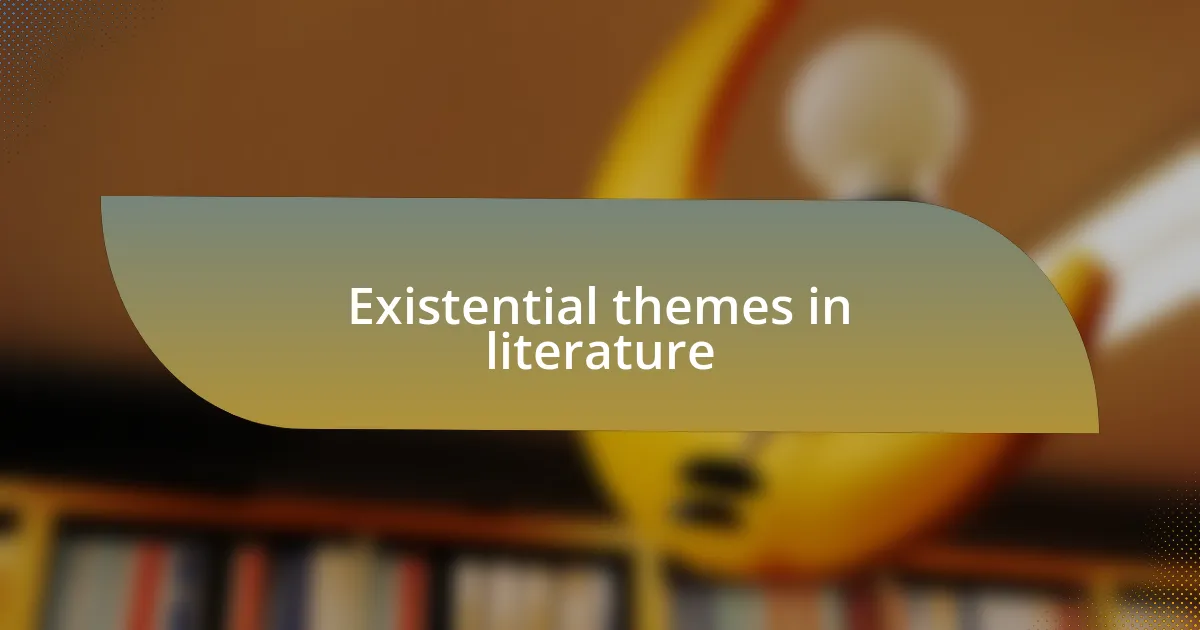
Existential themes in literature
Existential themes in literature often delve into the profound questions about human existence, identity, and the search for meaning. When I first encountered Dostoevsky’s “Notes from Underground,” I was struck by the protagonist’s torment over free will and his relentless struggle against societal norms. Can we truly define ourselves without the harsh glare of society, or are we forever entangled in its expectations? These dilemmas resonate deeply with readers, making us reflect on our own lives.
I remember reading Kafka’s “The Metamorphosis” and feeling a pinch in my gut when Gregor Samsa transforms into a bug. It wasn’t just about the grotesque change; it epitomized profound alienation and the crushing weight of societal rejection. This theme reminds me of those moments in life where we feel like outsiders, questioning our place in a world that seems indifferent. How often do we, too, feel that disconnect between our true selves and the roles we are forced to play?
Moreover, existential literature often challenges the notion of a predetermined path, leading us to ponder the authenticity of our choices. I often reflect on Camus’ “The Stranger,” where Meursault’s emotional indifference raises unsettling questions about morality and the absurdity of life. It prompts me to wonder—does our culture’s obsession with finding meaning distract us from experiencing life in its raw, unfiltered form? Engaging with these texts not only deepens our understanding of existentialism but also compels us to confront uncomfortable truths about our existence.
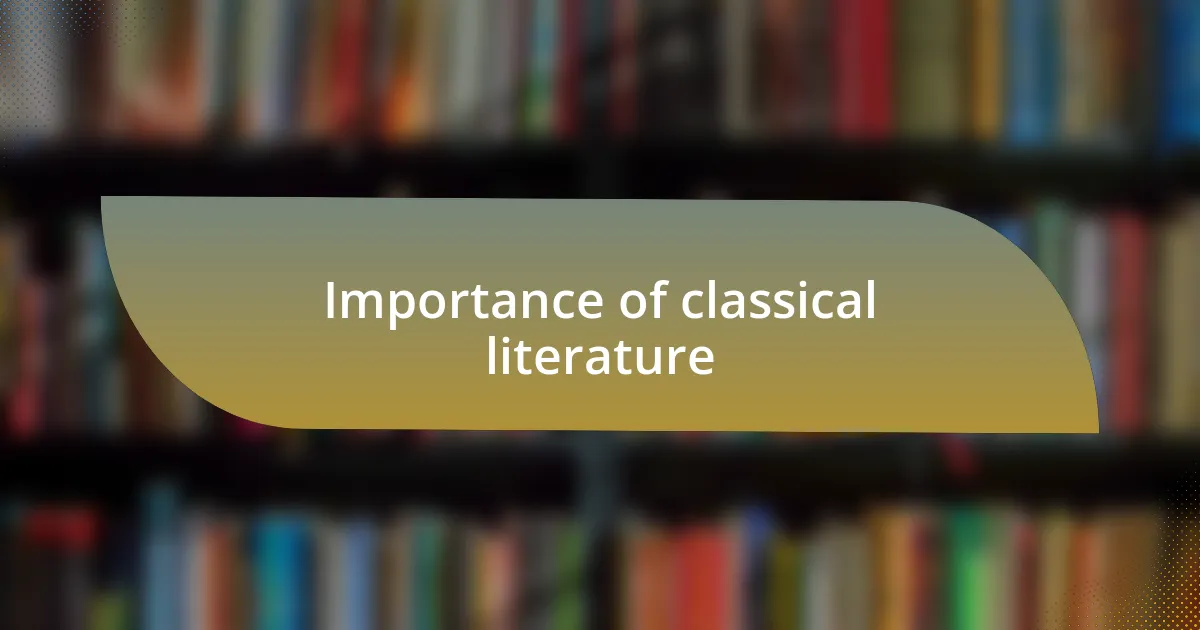
Importance of classical literature
Classical literature serves as a timeless mirror, reflecting the complexities of human nature and societal dynamics. When I read Homer’s “The Iliad,” I was captivated by the intricate web of honor, pride, and the futility of war. It made me think about how these themes continue to resonate today. How many of us find ourselves grappling with similar struggles, whether in personal conflicts or global tensions?
The richness of language and emotion in classical works helps cultivate empathy and understanding in readers. I recall the first time I journeyed through Shakespeare’s “Hamlet.” The intense internal conflict of its characters overwhelmed me, transporting me into their struggles with betrayal and existential angst. It opened my eyes to the depth of human emotion—how can we better understand ourselves and others if we do not witness these experiences through literature?
Moreover, classical literature encourages introspection and philosophical exploration. I remember pondering over Virgil’s “Aeneid,” questioning the nature of duty and destiny while following Aeneas on his quest. It made me wonder about the paths we choose and the responsibilities that shape our lives. Isn’t it fascinating how these ancient texts can still prompt reflection on our modern dilemmas?
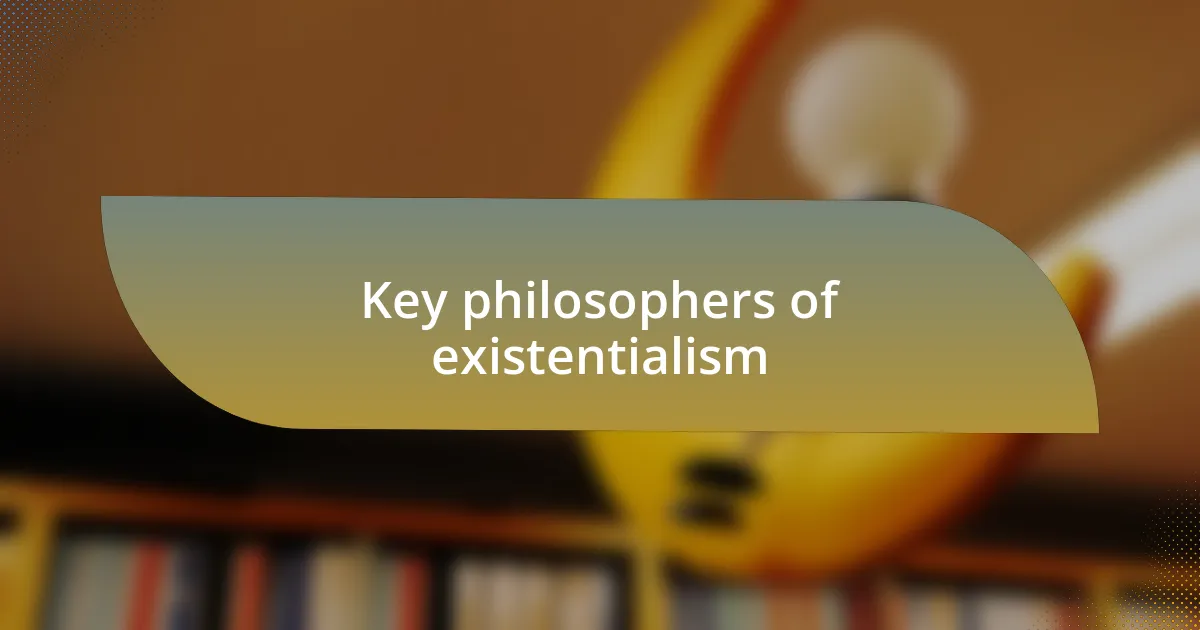
Key philosophers of existentialism
When discussing key philosophers of existentialism, I often think of Søren Kierkegaard, who is widely regarded as the father of existential thought. His exploration of individuality and the “leap of faith” resonates deeply with me. I remember grappling with the notion of making choices in life, reflecting on his belief that true understanding emerges from personal experience rather than abstract reasoning. How do we confront our anxieties when faced with the gravity of choice?
Friedrich Nietzsche is another central figure in this realm. His proclamation that “God is dead” struck me profoundly during my college years when I was wrestling with my beliefs and the nature of morality. Nietzsche’s idea that we must create our own values in a seemingly indifferent universe challenged me to reflect on how I define purpose in my own life. Isn’t it empowering to think we hold the reins of our existence?
Then there’s Jean-Paul Sartre, who famously claimed that “existence precedes essence.” This notion hit home for me during a time when I felt pressure to conform to societal expectations. Sartre’s perspective encouraged me to embrace the freedom and responsibility of crafting my own identity, and I still ponder how liberating it can be to recognize that I am the author of my own narrative. How often do we really stop to consider the weight of our choices and the freedom that comes with them?
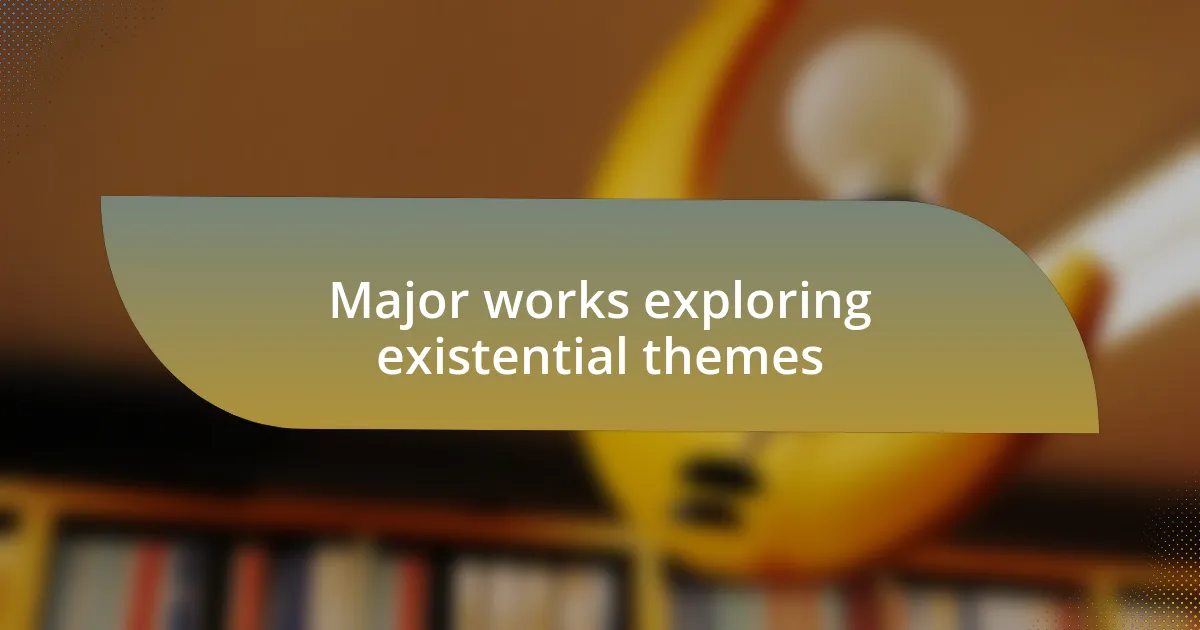
Major works exploring existential themes
Several literary works powerfully explore existential themes, each providing a unique lens through which to examine human existence. One standout is Fyodor Dostoevsky’s “Notes from Underground,” which presents a deeply conflicted narrator confronting the absurdity of life. I remember wrestling with his portrayal of the struggle between desire and rationality, feeling that it mirrored my own internal battles. Have you ever felt trapped in your thoughts, questioning the very essence of your choices?
Albert Camus’ “The Stranger” is another critical work that delves into existentialism, particularly through the character of Meursault, who embodies absurdity and emotional detachment. I found his indifference to societal norms both unsettling and liberating. It made me ponder: how often do we conform to expectations, and what does it mean to truly live authentically in a world that seems to demand otherwise?
Then there’s Franz Kafka’s “The Metamorphosis,” a profound exploration of alienation and identity, where Gregor Samsa wakes up transformed into a giant insect. This bewildering scenario resonated with me as it speaks to feelings of isolation and the absurdity of existence. I can vividly recall moments in my life when I felt more like an outsider than a participant, forcing me to confront the unsettling idea of what it means to be human in a world that can be so unwelcoming. Isn’t it curious how literature can mirror our struggles and offer insights into our own existences?
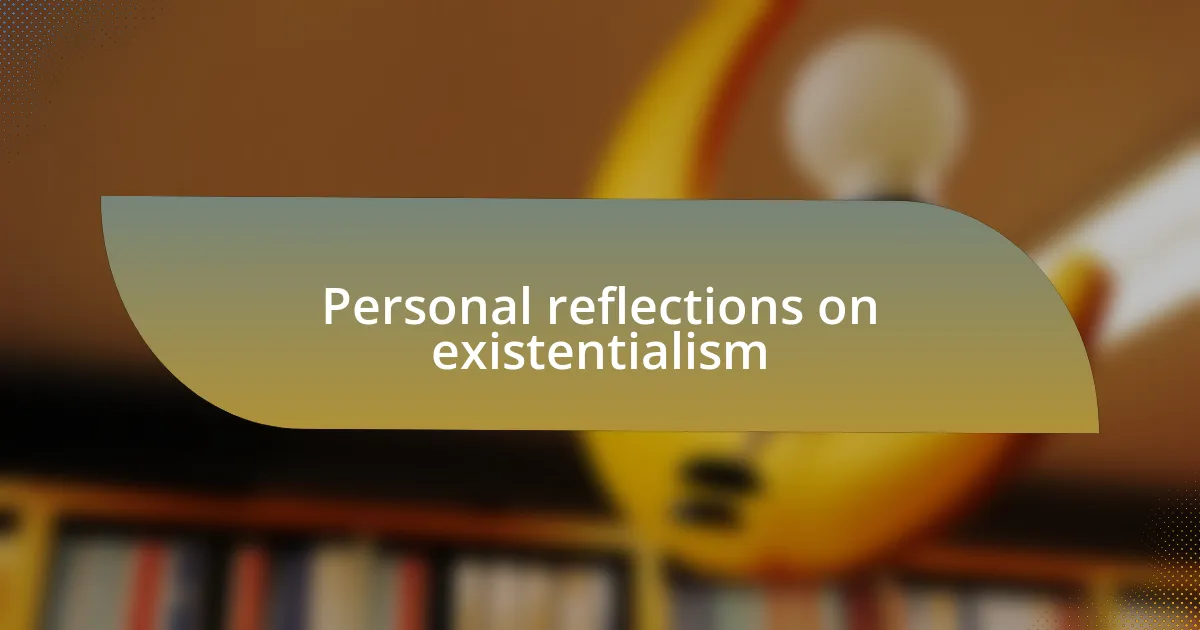
Personal reflections on existentialism
Reflecting on existentialism, I often find myself drawn to its uncanny ability to illuminate the darker corners of the human psyche. When I first encountered Nietzsche’s concepts, it felt like a veil had been lifted. I vividly recall sitting in a cafe, engrossed in “Thus Spoke Zarathustra,” and feeling a mix of enlightenment and dread as I grappled with the idea of the “Übermensch” and the weight of creating my own values. Have you ever experienced the almost overwhelming freedom that comes with acknowledging your responsibility in shaping your own life?
I can still remember the first time I read Jean-Paul Sartre’s “Nausea.” The visceral depiction of existential angst struck a chord deep within me. The protagonist’s struggle with the meaninglessness of existence made me reflect on my own doubts – moments when I questioned whether the mundane routines of life held any significance at all. It’s a thought-provoking question: how do we find meaning in the chaos, and can we afford to ignore the absurd while pursuing our desires?
In my perspective, existential themes highlight the intricate dance between despair and hope. Take “Waiting for Godot” by Samuel Beckett, for instance. I found immense resonance in the seemingly futile waiting of Vladimir and Estragon. Their conversations, rich yet circular, made me think about the nature of hope itself. How often do we find ourselves waiting for a resolution, a purpose, or a sign? The absurdity of their situation made me confront my own tendencies to linger in uncertainty, prompting intriguing questions about the nature of existence and our search for meaning amidst the chaos of life.
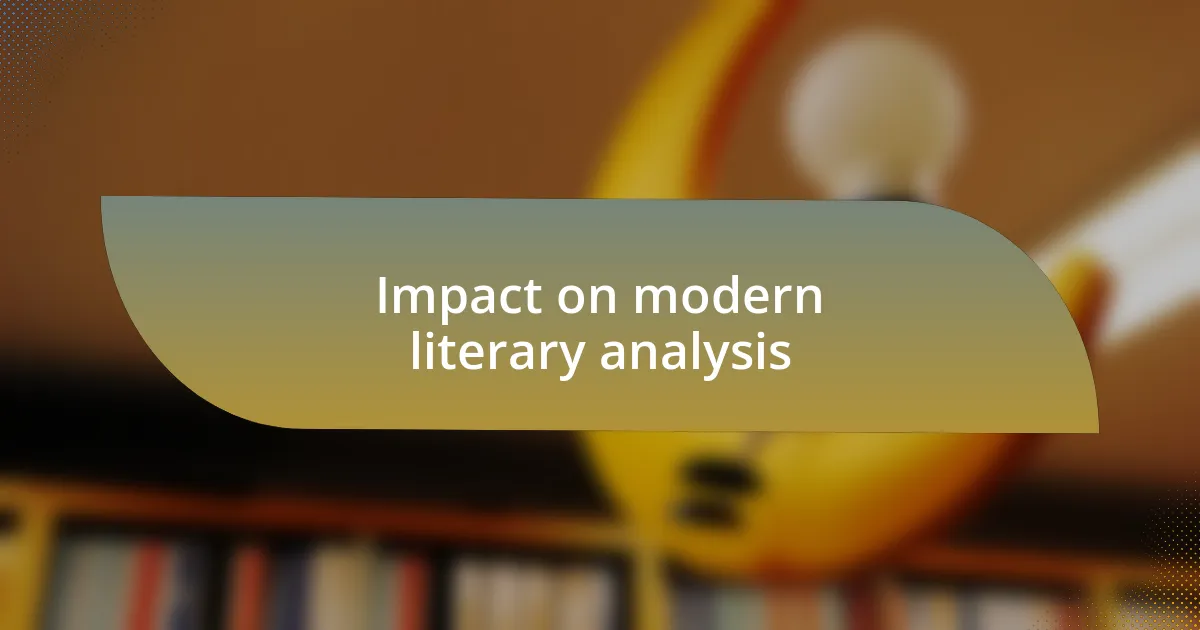
Impact on modern literary analysis
The influence of existential themes extends far into modern literary analysis, enriching our understanding of characters and narrative structures. I remember a particularly engaging seminar where we dissected Murakami’s “Kafka on the Shore.” The discussions illuminated how characters navigating absurdist landscapes reflect contemporary anxieties about identity and purpose. Isn’t it fascinating how the exploration of existential dread can shape our interpretations of motivations and choices in modern literature?
Moreover, the resurgence of existential inquiry in literary criticism has led to new methodologies that embrace ambiguity and fragmentation. I once analyzed a collection of short stories by Alice Munro, where the characters’ fleeting moments of clarity amidst confusion invited a deeper examination of personal significance. This blend of the mundane with existential questions resonated with me—what drives us to find coherence in disjointed experiences? It reminded me that modern narratives often echo the quest for meaning, inviting readers to engage with their realities in profound ways.
As I reflect on my own experiences with existential themes, I see how they compel readers to confront uncomfortable truths about existence. I distinctly recall a moment when discussing Kureishi’s “The Buddha of Suburbia.” The layered complexities of identity and choice sparked lively debates among my peers. It’s intriguing how these discussions challenge us to rethink conventional narrative arcs, pushing boundaries to uncover the messy, often contradictory nature of human life. How do we reconcile the chaos of existence with the stories we tell ourselves?